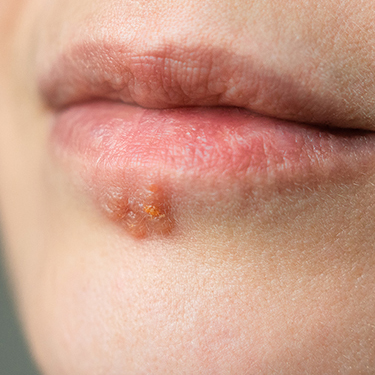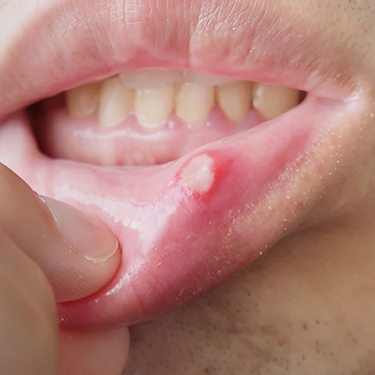Is It a Canker Sore or a Cold Sore?
Understanding Two Common Mouth Sores
Updated January 2025
Have you ever had a painful sore pop up in or around your mouth? If so, you may have wondered if it was a canker sore or a cold sore. While these sores might seem similar at first glance, they’re actually quite different. Knowing what sets them apart will help you properly address them.
Appearance: Spotting the Difference
They are definitely worth mentioning at your next visit.— Emily M. Tuerk, MD

Cold Sores: Ever had a pesky little blister pop up on your lip? That’s probably a cold sore (also called a fever blister). These fluid-filled troublemakers usually pop up on or around your lips and, although less likely, sometimes inside your mouth. They can show up in the form of a single blister or a group of them, and they tend to get crusty when they burst.

Canker Sores (aphthous ulcers): If you spot a sore inside your mouth maybe while you brush your teeth, you’re likely dealing with a canker sore. Canker sores always appear inside your mouth. These are small, round sores that are white or yellow with a red border. You’ll find them on your tongue, gums, inside your cheeks, lips or soft palate. Canker sores that persist for several days to several months are called recurrent aphthous stomatitis.
Causes: What’s Behind the Sores?
Cold Sores: Cold sores are caused by a virus called herpes simplex-1 (HSV-1). The herpes simplex virus is contagious and can spread through things like:
- Kissing someone who has a cold sore
- Sharing a drinking glass with someone who has a cold sore
- Sharing utensils with someone who has a cold sore
- Sharing lip balm with someone who has a cold sore
Most people are first exposed to the HSV-1 virus during childhood. This initial infection can be quite uncomfortable and often causes symptoms like fevers, headaches and very painful sores inside the mouth and on the lips.
But here’s the kicker. After getting infected, the virus doesn’t just go away. Instead, it stays dormant inside your nerves, until something triggers it. Common triggers include:
- Stress
- Illness
- Too much time in the sun
When the virus gets re-triggered, it can cause cold sores. While you’re more likely to spread the virus when you have visible sores or just before they appear, it’s worth noting that in rare cases, the virus can spread without any visible signs.
Canker Sores: Unlike cold sores, canker sores are not caused by a virus, and they’re not contagious. Although their cause isn’t exactly known, these sores may be triggered by:
- Mouth injuries or irritation, such as accidentally biting your cheek or friction from braces
- Allergies or sensitivities to specific foods or products, including citrus fruits or certain toothpastes. Consuming certain types of foods, like spicy foods, can increase your risk of developing canker sores.
- Nutritional deficiencies
- High levels of emotional stress, which can impact your body’s immune system
- Some infections or illnesses
The likelihood of canker sores tend to run in families (For example, if your family members get them often, you’re more likely to as well.), and they are more common in children and adolescents.
Symptoms: Signs to Watch For
Cold Sores: Cold sore symptoms can vary. Some people have no symptoms with their first outbreak while others experience flu-like symptoms. If you do have symptoms, they will likely last between two and 20 days after getting exposed to the virus. These symptoms include:
- Tingling or itching before the blister appears
- Painful blisters that eventually crust over
- Burning sensation
- Dry or irritated lips
- Crusty sores that last for up to three weeks
- Fever
- Swollen lymph glands
- Muscle aches
Sometimes, the virus can spread to your eyes. If this happens, you might notice your eyes become red, itchy or puffy. Seek immediate medical care if this happens.
Canker Sores: Canker sores typically appear suddenly and without warning. They can be quite painful and uncomfortable, especially when eating or drinking.
How to Treat Canker Sores and Cold Sores: Managing the Discomfort
Cold Sores: While there’s no cure for cold sores, antiviral medications can help them heal faster. These can be taken as pills or applied as creams. Without treatment, cold sores typically heal within two to three weeks.
For people who get cold sores often, your physician might recommend a preventive medication. There are also simple steps you can take to help reduce the duration of an active cold sore. These include:
- Finding healthy ways to manage stress
- Staying healthy to avoid colds and the flu
- Getting seven to eight hours of uninterrupted sleep at night
- Using sunscreen and lip balm with SPF when in the sun
Canker Sores: Most canker sores will heal on their own within one to two weeks, but they can still cause pain. Over-the-counter topical treatments can help relieve this. In severe cases, a prescription medication may be needed.
While you’re waiting them out, you can take some simple steps to make your mouth a bit more comfortable. These include:
- Rinsing your mouth out with salt water several times a day. Do not use hydrogen peroxide or milk of magnesia as mouth rinses. Hydrogen peroxide is dangerous to ingest. You can put a small amount of milk of magnesia on a cotton swab and dab it on your canker sore several times a day.
- Applying ice
- Avoiding foods that may irritate the sores (like citrus fruits and spicy foods)
When to Seek Care for Your Sores
Cold Sores: Most cold sores will heal on their own, but there are times when you should seek care. Reach out to your physician if:
- Your sores don’t heal within two to three weeks.
- You have frequent outbreaks.
- Your sores are unusually large or painful.
- You have difficulty eating or drinking due to pain.
- You develop a fever or other symptoms of illness.
- Your sores are near your eye.
- Your sores look infected.
- You are taking other medications.
- You are pregnant.
Canker Sores: Canker sores will also heal on their own, but you should seek care from a doctor or dentist if your sores:
- Are very painful
- Last more than two to three weeks
- Are very large in size
- Keep coming back
“Both canker sores and cold sores can be a nuisance, but your physician likely has some prevention and treatment strategies they can discuss with you. They are definitely worth mentioning at your next visit, especially if they are happening frequently,” says Emily M. Tuerk, MD, an internal medicine and pediatrics physician at Northwestern Medicine. “Your physician can confirm your diagnosis based on your history and make recommendations, so you can continue enjoying life without worrying about them.”






